Energy sector changes in the Senate's "Magnificent Energy Act": contenders and opponents revealed
The Senate Finance Committee has unveiled its portion of the highly anticipated "Big, Beautiful Bill," which includes plans for clean energy tax credits, some of which were sought to be repealed in the House's version.
One of the most significant changes in the Senate's proposal is a more gradual phaseout of solar and wind project tax credits compared to the House's version. While these credits terminate in 2027, certain exceptions apply. However, these exceptions are unlikely to aid any projects already in development.
The Senate's version of the bill favours traditional energy sectors and defense industries. It provides access to long-term tax credits for geothermal, hydropower, nuclear energy, and energy storage credits. On the other hand, it significantly restricts tax credits for new electric vehicles and home energy modifications, potentially favouring established fossil fuel and defense companies over renewable technologies.
The $4,000 incentive for used EV purchases will end in three months, and the $7,500 tax credit for new EV purchases will terminate about six months after the legislation is signed. Rebates for home energy upgrades, including to help homeowners buy electric heat pumps and other efficient appliances, will also be phased out in 180 days. No specific tax credits were allocated for battery storage projects in the Senate bill for home energy improvements.
In contrast, geothermal and hydropower projects will be able to tap 45Y production tax credits until 2036. Utility-scale battery storage will also enjoy incentives until 2036, with the value of the incentives tapering over the years.
Interestingly, nuclear power was notably spared in the House's gutting of clean energy incentives, and the Senate bill includes tax credits for nuclear energy projects. However, hydrogen did not receive tax credits in the Senate iteration of the bill.
The Senate's proposal is more lenient towards certain solar and wind projects. Projects beyond 2027, which are at least 1 gigawatt, on federal land, and have Bureau of Land Management right-of-way approval, can access tax credits.
The House version of the bill required clean power projects to start construction within 60 days of the bill's passage to access production and investment tax credits. In contrast, homeowners will only be able to get tax credits for rooftop solar installations for 180 days after the bill's passage.
The Senate's proposed phaseout of solar and wind project tax credits is more gradual compared to the House's version. However, the implications of this gradual phaseout, coupled with the bill's favouritism towards traditional energy sectors, could potentially hinder the growth of renewable technologies in the future.
Read also:
- Trump's Policies: Tariffs, AI, Surveillance, and Possible Martial Law
- Countries with the Greatest Human Capital Index in Africa in the Year 2025
- Emergency rooms outperformed by infusion centers for improved results in patients experiencing acute pain episodes and sickle cell disease
- Urban Pacific in Miniature: Playa Renaciente as a Compact Cityscape








